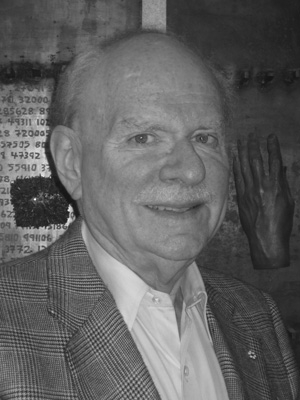“Life is real, life is earnest, and the grave is not the goal,” reads the caption in the 1954 McGill University Yearbook under Arnold Steinberg’s graduation photograph. Whatever life’s goal, as a commerce student at McGill five decades ago Steinberg never imagined that one day he would become the university’s 18th chancellor.
 In Jewish culture, 18 is considered a lucky number - representing as it does the numeric value of the word, Chai, which means Life and is also the 18th letter in the Hebrew alphabet. The irony that he will be sworn in as McGill’s 18th chancellor in November is not lost on Mr. Steinberg. “On the day of the announcement I hadn’t even thought of it, to be perfectly honest,” he said in an interview. “Jews have figured so prominently at McGill in the last number of years, they almost go unseen,’’ he says. “Obviously, it wasn’t done intentionally. The principal, the chair and the chancellor are now all Jewish. But a number of people have phoned to point out the irony - and being number 18, I have to say, is both humbling and gratifying.” The senior partner of the Clemen, Ludmer, Steinberg, an investment holding company, Mr. Steinberg’s association with the university is long and distinguished. He became involved with the Montreal Children’s Hospital, and in 1976 was one of the founders of Canadians for Health Research and served as its Chairman for 19 years, and over the years has made major contributions to medical health research, including the establishment of the McGill Medical Stimulation Centre.
In Jewish culture, 18 is considered a lucky number - representing as it does the numeric value of the word, Chai, which means Life and is also the 18th letter in the Hebrew alphabet. The irony that he will be sworn in as McGill’s 18th chancellor in November is not lost on Mr. Steinberg. “On the day of the announcement I hadn’t even thought of it, to be perfectly honest,” he said in an interview. “Jews have figured so prominently at McGill in the last number of years, they almost go unseen,’’ he says. “Obviously, it wasn’t done intentionally. The principal, the chair and the chancellor are now all Jewish. But a number of people have phoned to point out the irony - and being number 18, I have to say, is both humbling and gratifying.” The senior partner of the Clemen, Ludmer, Steinberg, an investment holding company, Mr. Steinberg’s association with the university is long and distinguished. He became involved with the Montreal Children’s Hospital, and in 1976 was one of the founders of Canadians for Health Research and served as its Chairman for 19 years, and over the years has made major contributions to medical health research, including the establishment of the McGill Medical Stimulation Centre.
“I’m a closet hypochondriac,” he jokes. But. Steinberg’s in interest medical science began because one of his children suffered from allergies and he discovered that the Montreal Children’s Hospital wasn’t doing significant research into allergic reactions.
“It was a question of circumstance. All of that sort of coalesced. We felt we could advance both the academic and clinical side of the area,” he says.
Steinberg then supported the program set up by Dr. Charles Scriver, one of the Canada’s leading geneticists, to have vitamin D added to milk sold in Quebec. “There was great joy in supporting leading edge science in that it was so different from anything I had been exposed to. It added a whole new dimension to my life, and it never, ever ceases to be fascinating.”
Steinberg’s grandmother, Ida, founded what was once Quebec’s largest chain of grocery stores. He enrolled at McGill but wasn’t interested in becoming an accountant. “I took the minimum number of courses,” he says, and was captain of the university’s water-polo team. He took a course in economic history from Cyril James and Eric Kierans, who went on to become Quebec’s Revenue Minister was one of his teachers. “He was unusual in that he was the only professor I had who had any business experience,” says Steinberg.
Being Jewish on the McGill campus in the 1950s still carried a bit of a smudge, but Steinberg says he pe rsonally never encountered any anti-semitism. ‘‘It is part of McGill’s history, it has been well documented, and McGill has not tried to hide the fact,” he points out. “Clearly major changes have taken place over the years, I don’t recall in anyway feeling any sense of discrimination. Certainly, in medical school and in Engineering societies there were still some restrictions in the 1950s, but by the time I went, there was a fairly high percentage of Jewish students at the graduate level, and most of my friends were Jewish, people like Leonard Cohen and the Shapiro brothers.”
Steinberg took his MBA at Harvard, and went on to become the chief financial officer of both the grocery chain and its real-estate division, Ivanhoe Inc. When the food stores were sold 20 years ago, he became senior officer of an investment holding company. He has been a member of McGill’s board of governors and Chair of Health Infoway an independent organization established by the federal and provincial governments to promote electronic health information services.
Steinberg has a discriminating eye for contemporary art and has assembled one of the Canada’s largest private collections of modern art. He also enjoys chamber music and is involved with Marlborough College Concert Society, which promotes the advancement of chamber music.
He was recognized for his philanthropy with an order of Canada in 1993.
His wife, Blema, teaches political science at McGill.

























Commentaires
Veuillez vous connecter pour poster des commentaires.